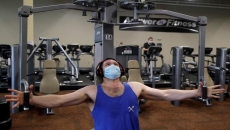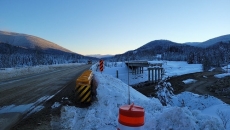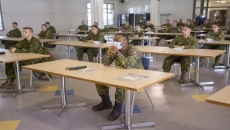The Bank of Canada may have to raise interest rates further, given that inflation may stay high for some time, said governor Tiff Macklem Thursday.
His speech at the Calgary Chamber of Commerce came one day after the central bank decided to hold its key interest rate steady at five per cent as signs of an economic slowdown grow.
Statistics Canada reported last week that the economy shrank in the second quarter, while the unemployment rate has been rising for three consecutive months.
However, Macklem said on Thursday that the central bank’s governing council agreed rates may need to rise again.
“In trying to balance the risks of under- and over-tightening, the governing council decided yesterday to keep the policy rate at five per cent and agreed there may be a need to raise the policy rate further if inflationary pressures persist,” Macklem said.
Canada’s inflation rate was 3.3 per cent in July, but the Bank of Canada expects inflation to flare up in the coming months before declining again.
Macklem also held a news conference Thursday, where he faced questions from reporters about the central bank's political independence in light of comments from elected officials on its policy decisions.
Finance Minister Chrystia Freeland faced some criticism Wednesday for appearing to praise the central bank for holding its key rate, saying in a statement that the decision was "welcome relief for Canadians."
Later that day, the NDP — which has been critical of the rate hikes — went further, suggesting the finance minister should ask the Bank of Canada to stop raising interest rates.
Macklem said elected officials are clearly hearing from constituents about the pain high inflation and rising interest rates are causing. The central bank is hearing the same thing, he said.
The governor wouldn't comment on what he would do if the finance minister ever issued a directive to the central bank regarding interest rates — something that's never happened in the Bank of Canada's history but is within the powers of the minister.
"I think the deputy prime minister has been very clear that she fully respects the independence of the Bank of Canada," Macklem told reporters.
As the central bank focuses on its task of wrestling inflation back down to two per cent, the governor spent a considerable amount of time in his speech defending the central bank's inflation target. Although inflation may seem close to two per cent, he said, reaching two per cent is crucial to maintaining predictability and stability in the economy.
The governor said the slowing progress on getting inflation down either means previous rate hikes need more time to take effect, or interest rates aren’t high enough yet.
The central bank is looking for evidence that inflation is not only falling, but that large price increases are becoming less common across the economy.
For that to happen, Macklem said demand in the economy needs to continue slowing.
“But I want to be clear – we are not trying to kill economic growth,” Macklem said.
Instead, the governor said the best way the central bank can support the economy is by making sure inflation comes back down to the two per cent target.
When asked whether Canada is already in a recession, Macklem said he doesn't think so.
As to whether the country is headed for one, Macklem said Canada may experience two consecutive slightly negative quarters of growth, which would meet the technical definition of a recession.
"I don't think a couple of very small negatives are what most people think of when they think of a recession. It's not a big contraction in output. It's not a large rise in unemployment," he said.






